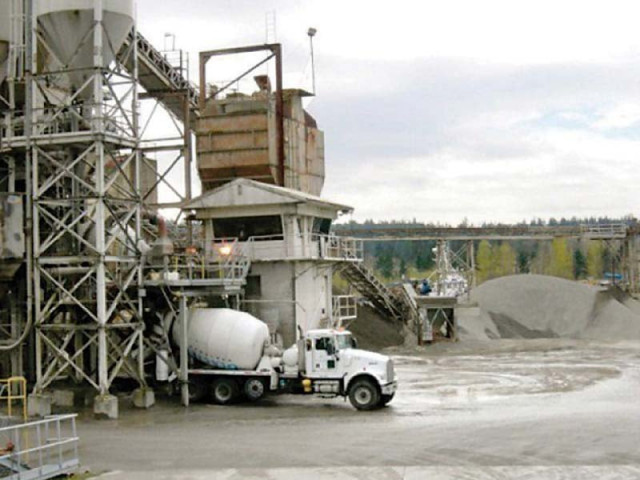Maple Leaf completes expansion of cement plant
However, cement demand falls due to reduction in development spending by govt

Sales of the cement industry in the domestic market fell in double digits in February 2019 compared with the corresponding month of last year. PHOTO: FILE
“Maple Leaf Cement has completed the expansion of its new cement line,” the company reported in its quarterly progress report on the expansion project in a notice sent to the Pakistan Stock Exchange (PSX).
“The company has undergone to set up an additional dry process clinker production line of 7,300 tons per day,” said the notice.
The company has made the expansion under the brownfield category, which gives some tax benefits, at the company’s existing site in Iskanderabad, according to the notice. The extension will help the company take grey cement production capacity up to 18,000 tons per day.
Maple Leaf signed the engineering, procurement and construction (EPC) contract and opened a letter of credit on March 17, 2017 in favour of plant supplier FLSmidth A/S, Denmark for supplying and setting up the new production line.
The company has revised the cost of the project, which is estimated to be completed at a cost of Rs26 billion, according to the notice. The cement manufacturer is financing 41% of the cost from its books while the remaining 59% is the debt. Despite announcement of the expansion, Maple Leaf share price rose just Rs0.12, which was attributed to the surplus production of cement in the country.
With the addition of Maple Leaf plant, the demand would further fall in the coming month of Ramazan, so prices in the northern region were expected to come under pressure, said Syeda Humaira Akhtar, Chartered Financial Analyst at BMA Capital Management Limited.
However, prices in the south will remain stable as demand growth is in double digits and there is no new supply.
Recently, the cement industry in the northern region of Pakistan witnessed a decline of Rs15-20 per bag in cement prices, but Attock Cement was safe from the plunge.
“Demand is decreasing and supply is increasing,” said Humaira. “All cement stocks have been affected except for that of Attock Cement as it is located in the southern region.”
Sales of the cement industry in the domestic market fell in double digits in February 2019 compared with the corresponding month of last year.
Pakistan’s cement producers aim to increase their production capacity from 49.4 million tons per year to 72.8 million tons keeping in view the numerous projects under the Public Sector Development Programme (PSDP) and China-Pakistan Economic Corridor (CPEC), according to the State Bank of Pakistan’s third quarterly report for fiscal year 2017-18.
“Demand in the northern region always comes from public-sector projects and they, relatively, do not have the option for export,” she said. However, “demand in the southern region comes from the private sector, which is intact, and it also has export option,” she added.
Northern region companies bear approximately an additional cost of $15 on every ton if they want to export cement.
Attock Cement’s Iraq plant
Meanwhile, Attock Cement announced in a notice sent to the PSX that trial production at its newly constructed plant had commenced.
Earlier in a notice issued on January 21, 2019, the company stated that the entire civil, mechanical and electrical jobs on the Iraq project had been completed and a cement grinding unit was now at the commissioning stage.
It stated that the company was in the process of obtaining permission for the import of clinker. As soon as the permission is granted, the company will start importing clinker and thereafter begin trial production. “The demand scenario in Iraq is very strong and it is going to be stronger with expected political and economic stability,” said Humaira.
“Iraq has allowed the import of clinker without any duty, but the country has imposed 100% duty on cement import,” the analyst revealed.
Attock Cement had started trial production but it could not commercialise its production until it took approval, which was expected to take around three to four weeks, she remarked.
Published in The Express Tribune, April 17th, 2019.
Like Business on Facebook, follow @TribuneBiz on Twitter to stay informed and join in the conversation.



















COMMENTS
Comments are moderated and generally will be posted if they are on-topic and not abusive.
For more information, please see our Comments FAQ